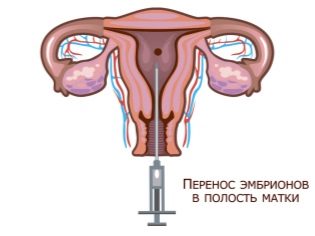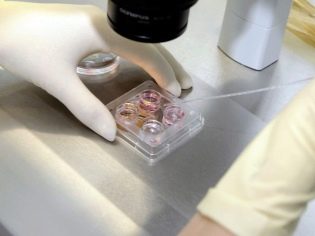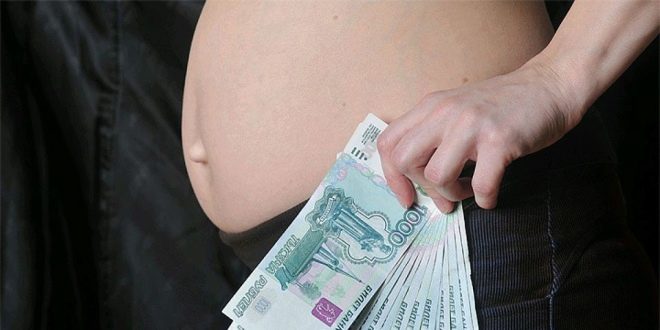What is surrogacy and what are its features?
Surrogate motherhood is one way to overcome the problem of infertility. And sometimes it is the only way out of this situation. However, of all the techniques that are designed to help people in the implementation of reproductive functions, it is surrogate motherhood that is subjected to the toughest criticism and the attitude towards it in society is very ambiguous.
What it is?
Surrogate motherhood is the same situation in which the third is not at all superfluous. In this way of overcoming infertility, three are involved, namely:
- a woman who gives her egg; she will be considered the biological mother of the baby;
- the man who gives the sperm is the biological father of the child;
- surrogate mother who makes a baby, gives birth to it and transfers it to biological parents.
Fertilization occurs in vitro by the method of IVF or IVF + ICSI. Provided that the biological material of the parents is suitable for fertilization, after pre-stimulation, oocytes are taken from the woman by puncture. A man gives sperm quite a traditional method - masturbation. The egg cell fertilized in the Petri dish is cultivated for several days and monitored by experienced embryologists. For 2–5 days, developing embryos are transferred to the uterus of a surrogate mother. That she, in case of successful implantation, will have to bear and give birth to the baby.
This method is allowed to use when a woman is completely unable to bear and give birth to the baby herself. For example, the uterus is absent or there are congenital or posttraumatic anomalies of its structures. To the help of surrogate mothers, children are resorted to those to whom pregnancy is contraindicated due to the presence of another, serious illness, in which carrying a fetus can be a mortal danger. In certain cases, the use of donor germ cells is required. For example, a woman has both ovaries and a uterus.
Female infertility in the family can be combined with male. If the spouses make such a decision, fertilization can actually be carried out using donor oocytes or spermatozoa. Embryos will also be picked up by the one who agrees to put up with them. Surrogate motherhood is in demand among single men who would like to raise a child on their own. A clear example is Philip Kirkorov, who raises his daughter and son, born a surrogate mother.
Surrogate motherhood can also be part of a deferred maternity program. If a woman at reproductive age has agreed to freeze her oocytes, then she can become a mother at 50, at 60, and even at 70 years old - there are no restrictions. After all, her own child, conceived with the help of cryo-transfer (using her own egg, frozen embryos), bears and begets for her a younger, stronger and healthy surrogate mother. An example of this are the children of Alla Pugacheva and Maxim Galkin.
The concept of "surrogate mother" WHO recommends replacing the more correct and less offensive concept - "gestational courier." It is understood that such a courier will not claim parental rights, try to keep the baby yourself. From the point of view of legislation and bioethics, the parents of the child are those whose gonads were used for fertilization.
All mutual relations of the future mom, dad and woman who carried out their baby are regulated by a special contract.
In Russia, the situation is often incorrectly referred to as surrogate motherhood, when a woman is undergoing intrauterine insemination by ejaculate of another man with the knowledge of his wife, who suffers from infertility, with subsequent delivery after the birth of the child to their family. In this case, the newborn baby is for genetically native and vital. Since 2012, in our country, a surrogate mother is prohibited from simultaneously being an egg donor in the protocol of assisted reproductive techniques.
In this there is a share of common sense. After all, the attachment of a woman who has given birth to a child, if he is dear, may turn out to be stronger than the desire to earn money and litigation will begin, problems will not be avoided by all participants of such a treatment cycle.
Story
The first case of surrogacy was described in antiquity by Plutarch. He captured in history a situation in which the barren Queen Stratonika, in order to ensure the continuity of royal power, allowed her husband, the king of Gaul, Deyotar, to conceive children with an alien woman. Subsequently, the heirs were transferred to Stratonike, and she raised them. Surmaturism Institute was quite widespread in ancient Rome. There, the representatives of the stronger sex put him on a broad financial and quite profitable basis - they rented their fertile and healthy wives to "rent" for families who could not conceive a heir for a certain fee. Born babies were handed over to the education of a barren couple and were considered their legitimate heirs.
The ancient Jews resorted to the help of slaves to solve the problem of marital infertility. The wife had the preferential right to choose one of the young and healthy slaves, who were entrusted with the right to carry the child away from her husband. The barren spouse herself took the birth and first had the right to touch the newborn. Science and medicine are not in place. Much time has passed since then, and emancipation played a role in the rejection of surrogate motherhood by society. Women began to appreciate and respect their right to reproduction.
The use of the female body to produce offspring on a commercial basis has become degrading and shameful. There are new ways of dealing with infertility, mankind has learned to extract germ cells for subsequent fertilization "invitro." But it is impossible to completely exclude such a method of becoming parents, since alternatives have not yet been invented. Fertilization can take place in vitro, but an incubator that would ensure the development of the child for 9 months has not been created. Perhaps this will be implemented in the future.
About gestational couriers in society again started talking at the end of the last century, as they began to practice IVF. In 1980, the mother of three children from Illinois, Elizabeth Kane, under the preliminary contract, endured and gave birth to a baby conceived by IVF for her fruitless acquaintances. Following the example of the Americans, such agreements began to be concluded around the world. At various times, Nicole Kidman, Sir Elton John, Michael Jackson, Cristiano Ronald and many other world celebrities had to turn to the surrogates. Not always this was a forced measure, based on the appointment of doctors because of the factors of infertility.
In Europe and the USA, for example, surrogate motherhood is highly developed due to homosexuality.
The legislative framework
Due to the ambiguity and even the piquancy of the issue, surrogate motherhood in different countries has a different legal status. For example, it is strictly prohibited in the Arab countries and the countries of the Middle East.France, Germany, Sweden and Norway, as well as some individual US states have also introduced a moratorium on the use of surrogate mothers in overcoming problems of childlessness.
In the UK, the commercial component is excluded - the surrogate mother does not have the right to receive remuneration for her services. Infertile spouses are only allowed to reimburse her daily expenses, which must be directly related to childbirth and childbirth.
In Israel and the Netherlands, attitudes towards surmatters are quite tolerable, but they are not allowed to advertise their services. In Israel, a woman who endured a baby for childless can legally achieve the right to be considered a mother if the parties have not taken care of the settlement of all the legal features of the baby’s status before birth. Regulatory surrogacy is permitted and supported by the state in almost all states of the United States, South Africa, Russia, Ukraine and Kazakhstan.
In Belarus, the authorities as a whole are not against surmothers, but the legislative framework of the republic contains very severe restrictions on the use of their services. In our country, this method is regulated by several laws and regulations at once - the Family Code, Federal Law No. 323, Federal Law on the Civil Registry Offices and the order of the Ministry of Health of the country No. 107H, which regulates the use of all reproductive medical techniques.
To register a child, get a birth certificate, biological mom and dad submit to the registry office a certificate from a medical institution in which they are listed as biological parents, as well as consent to register the baby from the woman who made him into the world - a surrogate mother.
Russian laws in force at the time of 2018 do not prohibit the use of surrogate motherhood by men and women who are not married and live without official marital status, as well as single women and men. For a single man, the process of registering a child afterwards may be somewhat difficult due to the existing “gaps” in the legislative framework. But on this issue, the State Duma of the Russian Federation is already working, where in May 2018 a bill was introduced, implying amendments to the Family Code, in order to make life easier for such parents.
Judicial practice on surrogacy in Russia is not as big as, for example, in the USA, where women even sought the right to participate in the upbringing of their children.
"Breaking points" were literally several court decisions, in fact, which determined the fate of surrogate motherhood on Russian territory. The so-called business of Natalia Gorsky gave an unequivocal right to a single woman to use the services of surrogates. In the registry office refused to register the child Natalia, who gave birth to another woman. The court considered this illegal, and secured the right to have children with single gestational couriers for single women. In 2010, the same issue was resolved by a court ruling for single men. The decision was made in Moscow. There, by the verdict of the servants of Themis, the man was allowed to receive a certificate for a child, who was conceived in a test tube with the use of his sperm and donor eggs, and who was carried by a surrogate mother. For the first time in Russian history, this kid appeared in the column “mother”.
There are still a lot of “white spots” in the laws of our country regarding this method of reproduction. For example, it is completely incomprehensible what a surrogate mother can do with a baby if something happens to her biological mom and dad during pregnancy, for example, they will divorce or die. The order of refusal of biological parents from the child during the period of pregnancy of the surrogate mother is also not regulated. Lawmakers and lawmakers still have work to do.
Ethics and religion
As already mentioned, surrogacy is considered by many as a crime against spirituality and the inviolability of marriage. Precisely because in the process of such a solution to the problem of infertility three are involved. Many religions decry the method and do not give their consent to parishioners and believers for the services of a surrogate mother. In Islam, only IVF is permitted with the use of the gonads of a husband and wife. No donor oocytes or sperm, and certainly not carrying a baby in someone else's womb is not allowed. Catholicism, in general, rejects IVF in any of its manifestations. In Orthodoxy, IVF has acquired the right to exist, but with serious reservations — donated germ cells are not recommended for spouses, as this undermines the mystery of the birth of a new life in marriage.
The services of surrogate mothers of the ROC are regarded as immoral and immoral. The official position of the church is that a woman who agrees to have a child for others behaves immorally, turning childbearing into a sale item. Families that agree to such infertility treatments are equally involved. In Israel, where all IVF programs are not easily supported, but are also sponsored by the state, the surrogate mother cannot be a relative, because from the point of view of Judaism, this is the great sin of incest.
And only Buddhism looks at gestational couriers more or less loyally - from the position of this religion, any methods are good if all the participants in the process as a result acquire a state of joy and happiness.
Psychologists and psychiatrists see big problems in this method. The psyche of a woman who, under the weight of circumstances, agreed to become a surrogate mother, is unstable primarily because of the difficult financial and life circumstances in which she fell. Therefore, it is possible that when circumstances are resolved, the woman will begin to perceive the baby in her womb as her own. Parting with him after childbirth can turn into a huge tragedy that will break the fate of both surrogates and her “customers.”
Lawyers point out that there are cases when families who have resorted to the services of a surrogate mother break up during the last pregnancy - the relationship begins to deteriorate, the man becomes interested not where he lived all this time, but where his long-awaited child. The result - a divorce, drama and mutual requirements of the spouses for the right to raise the baby after the divorce.
Proponents of the method claim that, in fact, there is no sale, no one exploits the woman, and the integrity of the family is not violated. Surmama voluntarily agreed to have a baby, this is her decision. The baby himself is a blood relative to biological parents. They practically adopt a child, but not a stranger, but their own one, which will be similar to them, inherit their habits and character traits, talents and even hereditary diseases, if any.
If the couple has only one way out - surrogate motherhood, you need to think carefully about all the long-term consequences of such a decision, including the problems of the spiritual and moral plan. Everyone makes this decision for himself.
Who can be a surrogate mother?
In Russia, according to the recommendations and orders of the Ministry of Health, any woman can become a surrogate mother with her voluntary consent and compliance with certain (rather strict) requirements. First of all, a woman should be in reproductive age. Under this age in a broad sense refers to the age of 42 years, but for gestational couriers there is another restriction - from 20 to 35 years. A prerequisite for participation in the program is the presence of at least one child in a woman, conceived and born by herself. If the woman is married, the notarial consent of the spouse for participation of the wife in the IVF program on the terms of a surrogate mother is required.
A woman should be healthy.It’s not easy to feel that way, but to confirm the state of one’s health with the results of a large-scale medical examination - gynecological, genetic, psychiatric, narcological.
A large list of tests is being submitted. Almost all medical specialists, such as a cardiologist, a gastroenterologist, a neurologist, a surgeon, an ophthalmologist and other doctors, must give their opinion on the eligibility for participation in the program. A woman must have a valid certificate of no criminal record and that she is currently not under investigation. She also signs an informed consent for compliance with all recommendations in the IVF protocol, for the use of hormonal drugs, for synchronization of the menstrual cycles of biological and surrogate mothers, for cryo-transfer.
How much does the service cost?
Surrogate mother services are not paid by the state if IVF is done according to a quota. In the treatment of infertility payment is made at their own expense, the couple also pays all costs for the surrogate mother on their own. There is no single cost for gestational couriers. Much depends on the region, on the state of the economy in it, because of how widespread such a service is in the region.
But there are average statistics that suggest that on average in Russia in 2018, surrogate mothers are paid about 1.5–2 million rubles. This amount is only payment for services, and all additional expenses, such as IVF, supportive therapy with medicines, pregnancy management, tests, meals, essential vitamins and medicines, diagnostics are paid by the “customers” in excess of the agreed fee. In addition, there is the practice of paying a monthly “salary” for a gestational courier - its average size in the country is from 25 to 50 thousand rubles a month, starting from the moment of establishing the fact of pregnancy and ending with childbirth.
According to parents in some regions, for example, in Siberia or in the Volga region, you can find a surrogate mother who agrees to take the child for a more modest fee - from 600-800 thousand rubles. The best way to reduce costs is considered to be participation in the program of a close relative of a wife or husband, in which case, by agreement of the parties, a couple can get by with considerably smaller amounts. In the metropolitan area, prices can exceed 2 million, and there's nothing you can do. The amounts are not regulated by law, they are established by the surrogate mother herself.
If, as a result of negotiations, mutual agreement is reached, it must be registered as an agreement even before joining the ECO protocol.
Some surrogates require that a sanatorium or stay at a resort be paid for at the time of gestation, as this benefits the unborn child. Some ask to pay her personal driver so that she can go shopping and her business without any risk to the fetus. Conditions can be very diverse. It should be understood that participation in the program is paid separately, and after delivery, separately. Most of the amount falls on the postpartum period.
Despite the fact that services of this kind are rather expensive in our country, couples should know that in the USA, for example, surrogate motherhood is three times more expensive than in Russia, while in Israel the cost of services is about one and a half times higher than in Russia. In Ukraine and Belarus, the cheapest surrogate mothers. The full program, including delivery and all related expenses in these countries, costs 15-20 thousand dollars. Therefore, it is precisely there that single Russian women who want to become biological mothers, but cannot do this at home, most often turn because of the high cost of the services of surrogate mothers and the IVF protocol with donor sperm.
How to find a surrogate?
By choosing a woman who will bear your child, should be approached most responsibly. A lot depends on this choice.You should not completely rely on specialists of clinics who may not take into account all the nuances. Do not trust offers on the Internet, because surrogate motherhood in the network is often associated with fraud. You can get information about the database of women who are participating in the program at the clinic where pregnancy is planned, as well as at specialized agencies. Each clinic that specializes in IVF usually has its own database and blacklist.
Clinics do not exchange databases, but they try to share the “black list” as often as possible. It contains data on surrogate mothers who violate the terms of the contract, hide their diseases, have bad habits, and are also seen in attempts to appropriate a born child or blackmail the biological parents of the public circumstances of the birth of their offspring after birth. If you choose a surrogate mother yourself, you must check it in this “black list” of the clinic staff. There are also own “blacklists” on the Internet, which are supplemented by the “customers” and “customers” themselves.
Do not be lazy, it is better to get acquainted with all the information that is available.
If the “performer” for the couple will look for a specialized agency, they will have to fork out for the services of intermediaries. These are disadvantages, and a definite plus is the competent legal support of the transaction, which will help protect the spouses from various negative consequences in the future. In no case can not enter into a contract with a surrogate mother in absentia.
It is imperative to meet with her in person, to communicate, because the spouses or the lonely “customer” will have to communicate with this person on various issues for quite a long time. It would be nice to understand and respect each other, not to feel any rejection and psychological discomfort.
It should be understood that the genes of the woman chosen for carrying the baby do not affect the future surrogate child. But influence on him may have a way of life of the one who will bear him. Even a healthy embryo can be ruined if the woman carrying it will take alcohol, smoke, be nervous. In a face-to-face meeting, it is worth asking what circumstances caused her to become a gestational courier, what her family circumstances are, and whether she can pay enough attention to this pregnancy. To talk about the terms of the contract, which, in essence, is similar to a labor agreement, it is best to proceed in the presence of a lawyer, because he will immediately be able to fix the conditions of the parties and draw them on paper.
You should not limit yourself, you should trust your intuition. Anxiety, unusual fears can "suggest" about the likelihood of possible danger.
Do not ignore your own forebodings. And you should remember that the candidate must be checked for decency. Blacklists, of course, do not reflect the whole reality, but can help prevent trouble.
How to make a contract?
You should not try to do it yourself or using the templates available on the Internet. The fact is that a contract with a surrogate mother is a document of special importance, any inaccuracies and ambiguous interpretation of any of the points can have sad consequences. It is best to entrust the design of the contract to a professional lawyer. The clinics usually do not provide such a specialist, but they have a list of lawyers who most often handle such arrangements.
All parties must be present when drafting the contract. Each of the participants, the lawyer must inform about all the nuances of cooperation and explain in detail the rights and obligations.
The contract should take into account the interests of all parties. Particular attention should be paid to the paragraph, which explains the procedure for transferring the infant to biological parents after birth.It should be clearly defined where, how, under what conditions the transfer of the child must pass. At what point (before or after) the remaining money of the surrogate mother should be transferred or given away. In a properly drawn up contract, there must be points that imply the observance of the interests of the child.
In practice, it also happened that a child was born with any pathologies, and biological parents refused to take him, and also refused to pay for the services of surmies, blaming her for the pathologies of the newborn. To exclude such situations, all possible circumstances, even such, should be provided for by the contract.
An agreement should be drawn up even if a close relative or best friend agreed to act as a surrogate mother. The circumstances of any of the parties may change, and then the occurrence of problems even with a person whom the “customer” knows well and for a long time is not excluded. Be sure to specify that the terms of the contract can not be changed by decision of one of the parties until the expiration of the document.
Reviews
According to reviews of women who resorted to the services of surrogate mothers, the most difficult thing is precisely in the search for a suitable candidate and in the subsequent organizational support of pregnancy. Biological parents should carefully ensure that the pregnant woman regularly takes the medications prescribed by her doctor and visits the doctor on time. Sometimes you have to rent an apartment and install video surveillance in it so that the spouses are sure that the gestational courier does not violate the terms of the contract.
The most preferred women are those in which the candidate is selected from among the residents of a neighboring state. At the same time, she is paid for travel, housing, food, and after childbirth (as stipulated by the contract), the woman undertakes to return to her homeland. Very good reviews of surrogates from Kazakhstan, Ukraine, Belarus, Moldova, China and even India.
There are online testimonials from surrogate mothers themselves, who describe the difficulties they faced.
The main difficulties arose with the consent of the spouse and moral experiences, because during pregnancy there were feelings that the child belongs to them. In addition, after receiving funds or during pregnancy, relations with legal second half are very complicated. It is very difficult for men to accept the position of their spouse, and also to understand that what happens to her is not treason. The majority of women, commenting on them, express bewilderment about the choice of the “work” of the authors.
As before, many continue to believe that it is better to adopt a child from an orphanage or to an orphanage than to use the services of a surm or to become one. There are those who sincerely thank the gestational couriers for their efforts, because they give other families, already desperate, happiness and joy of long-awaited parenthood.
On the psychology of surrogacy, see the following video.










































